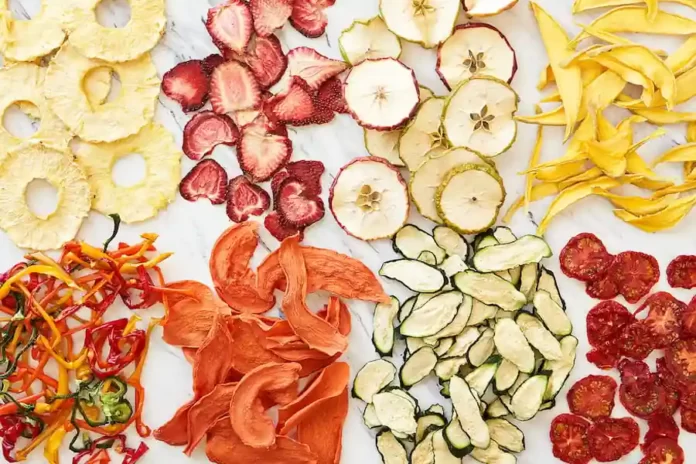What is Dried Food?
A lot of people ask about dried food and if it has benefits to us or it’s just a tool for emergencies.
Drying food happens by removing water and moisture from vegetables, fruits, meat and fish, through the use of a food dehydrator, oven, or by drying in the sun.
This helps prevent microorganisms such as yeast, mold and bacteria from growing and preserves the food for future use while preserving the nutrients healthy.
This makes food dehydrators a great tool for preserving fruits, vegetables, and meats.
Benefits of Dehydrated Food
Being Able to Buy in Bulk Without Worrying About Spoilage
Where you can visit the grocery and buy large quantities of fruits and vegetables, dry them, then store them for later use, and if you are interested in business you can even sell your dried food because it is very expensive in stores.
Save Time, Energy and Money:
Most people carry a grocery list but still get extra items like chips, candy bars and drinks, it’s called impulse buying and that’s why they put chocolates at checkout counters, once you get into the habit of preserving your food, you’ll need less time in stores and save money in the end.
Get Seasonal Food at Lover Cost
By drying food, you will no longer have to wait for the right season to enjoy nutrient-packed fruits and vegetables at an affordable price that weren’t in season, with dehydrated foods you can enjoy seasonal foods like pineapple and cherries no matter the season.
Save Time in Preserving Food Compared to Canning
It should be noted that canning means having to sterilize glass jars or cans before using them and having to prepare the sauce that is suitable for canned foods.
On the other hand, drying food requires washing and cutting food as needed, placing it in your food dehydrator, operating the machine and waiting for the process to finish.
Get Free Space
Since drying reduces the volume of food, you will not need a lot of space to store it other than you can freeze it. You can store dried food in different sizes from Mason jars or “Ziploc” bags. If you are considering long-term storage, you can choose airtight bags or containers. PVC.
Control the Food You Eat
If you are concerned about genetically modified food or if you are unsure of how foods are prepared in restaurants or fast food chains, drying food, especially if you are able to grow your own produce, would be a great option for you.
It is also highly recommended that you dry the food immediately after harvest to lock in the nutrients, while you can buy dried food in stores, some contain sugars and additives, so by drying the food on your own you will be sure that you are eating healthy food.
Eat Less Food
The concentration of fruit sugars enables you to eat a few dried fruits while still maintaining the same energy that you eat fresh; This is why dried foods are so popular especially on trips and camping.
They are also lightweight but full of nutrients. However, make sure to eat carefully when nibbling on dried food as it is easy to consume more than you need in a short period of time.
Also be careful if your work or daily activity involves a lot of sitting, excessive intake of dried fruits will make you gain weight very quickly.
Nutritional Benefits
You will have a large amount of antioxidants and fiber Dried foods, especially dried fruits, contain a greater concentration of fiber and antioxidants than fresh fruits.
Nutrients such as vitamin C, beta-carotene and iron are also kept the same.
Delicious flavour.
A better taste of food that can be enjoyed in various ways is obtained from dried and savory foods; Because they are not diluted, however, there are preservation enthusiasts who have recommended allowing dried foods to absorb some of the distilled water before consumption.
Waste Reduction
Drying fruits or vegetables, in addition to preserving food, is a way to reduce waste from vegetables and fruits, as Mother Nature will thank you, and you can dry food to enjoy foods that are closer to their natural state, which is more healthy.
Types of Dehydrated Food
Meat: beef, chicken, fish and lamb.
Vegetables: asparagus, beets, broccoli, carrots, corn, cucumbers, onions, potatoes, pumpkin and tomatoes.
Fruit: apple, banana, coconut, kiwi, mango, papaya and watermelon.

